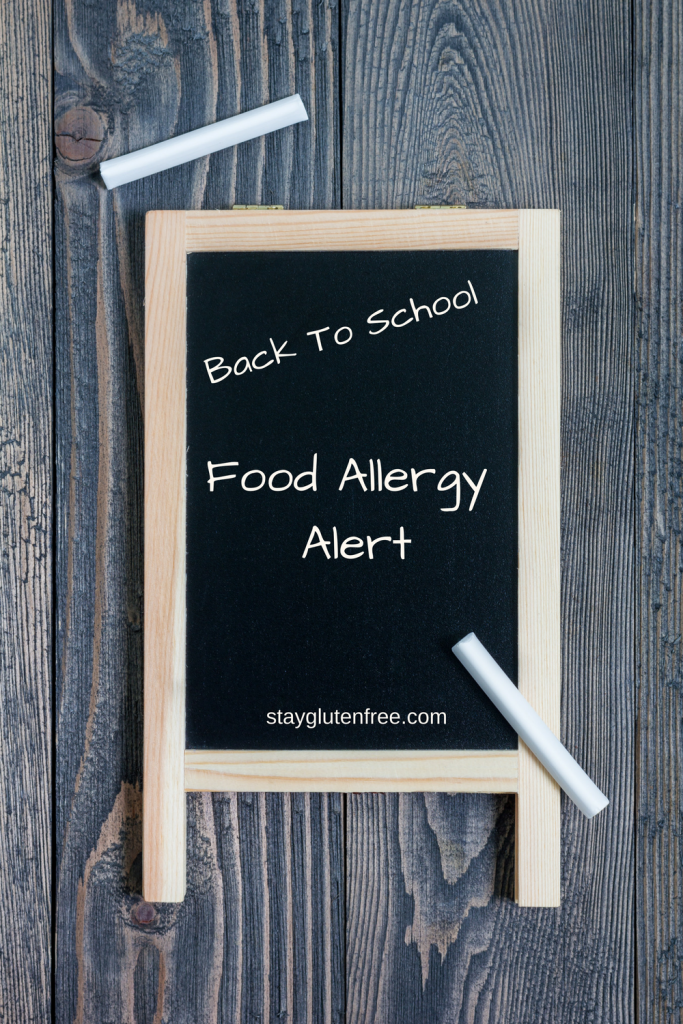It’s time to send our kids back to school. Are you ready? For us, this means so much more than buying school supplies and clothes. It means ensuring my kids are safe while eating lunch, celebrating birthdays, having parties and going on field trips. And preparing lunches that taste good and don’t set them apart from the rest of their peers.
For my kids (both this year..sniff) being back in school means that they will be back in someone else’s care for a majority of their day. And I need to prepare them, their teachers and myself for another successful school year. So these last few days before school starts are filled with so much preparation and emotion.
But let me take a minute and really rave about my past experiences with my oldest son’s teachers. Thankfully not only have they welcomed the information I have provided them, they also cared for him so well that it really put my mind at ease.
But I know I am not alone in all of these feelings and if you are new to gluten free living, I have prepared this list of 5 things you should do before you send your child back to school.
Since my son is more than just gluten intolerant, the information in this post will apply to more than kids who are just gluten intolerant or celiac.
1. Meet with the teacher in advance
I have done this since my oldest started his very first day of school and I can honestly say that this is probably the single most important thing you can do for your child’s safety. If you have a 504 plan in place, this might also be a good time to review it.
In addition to meeting with the teachers I also put everything in writing. What he is allergic to, his symptoms, what to do regarding accidental exposure and the best number to reach me. I want them to have all of this at their finger tips.
When he was in preschool I worked very closely with the teachers regarding what they also put in the sensory boxes for play. Even though the kids were not eating out of the sensory box, their little fingers are always coming into contact with their lips so it was important that sensory boxes were filled with safe ideas.
I will admit, this is hard in the beginning, in a world where food allergies are much more present than they used to be, it is sometimes hard to ask a teacher to make all of these changes and accommodations. Thankfully, all of his teachers have been absolutely wonderful.
What you should ask
- Is there a snack time, when is it?
- Will the children be required to wash their hands before and after snack and lunch?
- How are birthdays celebrated?
- Have you had anyone in your previous classes ever have an allergic reaction?
- Do you supervise lunch time? If not, who does?
Besides discussing your child’s allergies, symptoms and care, I feel like these questions are also so important. As I mentioned before, make sure you are either meeting with the teacher individually or sending him/her a detailed email with your hopes of the school year and your child. There is nothing worse than trying to go over all of this during a “meet the teacher” or an orientation. This will only leave you feeling worried whether or not your teacher understood everything you were trying to explain.
And remember, keep the lines of communication with the teacher wide open. Your child’s success is a team effort. You want your child’s teacher to feel comfortable coming to you with any and all questions.
2. Become familiar with school policies
Knowing the policies before you send your food allergy child to school is very important. They are in place for a reason. Now is the time to become very familiar with them and discuss anything that might jeopardize the safety of your child with the school administration.
What you should ask
- How is lunch handled? Are allergy kids separated?
- Where are the epi pens and medications kept?
- Is there a school nurse? If not, who handles the medications?
- What is the school policy on food coming into the building?
- What would happen in case of an emergency situation?
- Who handles the emergency medications on field trips?
These are just a few of the most important questions you should know the answers to. No question is too big or too small. This is your child, ask the questions! It might also be a good idea to review the school menu so that you have an idea of what they will be serving the other children.
3. Make a safe “snack box” to be kept in the classroom
I started doing this in Kindergarten and it was the best idea to help him feeling included when other children in his class would receive candy or an impromptu treat. I fill it with “allergy friendly” non-perishable treats and candy. These are to be kept it in the classroom at all times. He also knows right where the box is so that it doesn’t have to be a big production when he needs to get a treat.
I also make a small goodie bag with some safe candy for his music, P.E., art, spanish, and library teachers. I never want him to feel left out.
4. Practice self advocacy with your child at home
This is also another very important thing to do with your child. Food allergy talk is big talk at hour house (surprise, surprise). We talk about only eating what I have provided for my son and not what others give him. At his age, to say you can have food from this person, but not from this person is way too risky because it is a lot to remember. In my opinion, this is not safe. I also take the responsibility off of the teachers to read labels by telling them my son can only have what I provide. This takes the guess work out of it for everyone. When there is multiple allergies, this is a good way to eliminate risk.
Empowering your child to self advocate helps them take ownership of their allergies. You can teach them to recognize their offending allergens, and prepare them for a time when they get older and don’t want mom around (in my case, I hope never).
This year with my youngest, I will be back at square one. Thankfully he doesn’t have quite the list of allergens that my oldest son has, but he still needs to learn what food allergies are and how to distinguish the right foods from the wrong ones.
5. Build self confidence in your child
Having food allergies and not being able to eat everything everyone else is eating can leave your child a little left out and/or emotional. I think my oldest began to really feel it his last year of preschool. He wanted what the other kids were having and we really had to talk and learn a lot about his allergies. We talked about how he would feel if he had those offending foods and he began to understand that he did not want to be sick.
This was kind of when I began to match as much of his food to what the other kids were having with an “allergy friendly” version. He loved this so much, the look on his face and how him and his friends would discuss what he was eating was priceless. The look on his face when his friends would compliment how good his food looked was priceless.
Boosting your child’s self confidence will also help them as they advocate for themselves. It is a win win.
Am I saying that you have to do this? Absolutely not! This is just exactly what I do and it has helped me so much. But if just one of these tips helps you on your journey, I have done my job. You will find that most of my recipes are things that your child will love to eat. As mom’s our job is demanding enough and having food allergies adds a whole new layer to that.
You will become more and more comfortable each year as you send your child to back to school. It takes time and practice building these relationships with teachers and administration. Once you get the hang of it, it will become very easy.
Also, please don’t feel like you are alone. There is a whole stay gluten free community {join here, it’s FREE} that would love to help you. Join others just like you on this journey.
I hope you and your child(ren) have a wonderful and safe school year.
The post 5 Things To Do Before You Send Your Child Back To School appeared first on Stayglutenfree.com.



